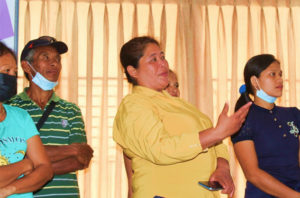ECONOMIC RIGHTS
Empowering Women Farmers to Empower Community

Women’s participation in society is a significant factor in overall economic growth. Community-based development is a recourse that can disrupt many patterns of gender inequality.
Implementing local development projects that advocate for community participation in decision-making and management provides women more access to the market and more relationships within their community.
A study on women solidarity initiatives in 2018 unfolded how rural social enterprises are constantly stepping up to the plate to address socioeconomic and environmental issues. The findings supported the notion that women’s initiatives positively impacted the management and execution of entrepreneurial activities that benefited not only the organization’s members but also their entire community.
In the Philippines, an illustration is the Man-ai Integrated Agroforestry Cooperative (MInAFFA), an indigenous farmers’ cooperative whose women members are making a significant difference in their community.
MInAFFA is one of the country’s abaca production guilds. It is located at Sitio Man-ai, Tignapoloan in Cagayan de Oro City with 59 households composed of 62 women and 44 men as members.
Partnership with ECOWEB
In 2021, Ecosystems Work for Essential Benefits, Inc. (ECOWEB), a non-profit organization helping farmers improve their living conditions, partnered with MInAFFA under the Formation of Production Guild and Social Enterprises for Economic Development of Indigenous Communities (FPG-SEEDIC) project. The project is being implemented by ECOWEB and is funded by Brot fur die Welt (Bread for the World), Federal Republic of Germany.
In 2022, ECOWEB’s current interventions through the FPG-SEEDIC project, and its benefit to the MInAFFA community was studied. It was revealed that the social enterprise has created a gender inclusive environment in various aspects of the cooperative.
Beginning of a Social Enterprise
A social enterprise is a “social mission driven organization in pursuit of partnerships with the poor to improve or transform their lives.” For MInAFFA, its partnership with ECOWEB paved the way into achieving its goal of establishing a social enterprise that would help uplift the lives of its members and the community.
Villaflor Cabaring, chairperson of the cooperative, stated that since the partnership with ECOWEB, they were able to improve their livelihood through establishing a sustainable social enterprise.
Through the program, MInAFFA received technical support, training, and seminars on crop cultivation, care, and harvesting. They were also given workshops in social enterprises and the financial assistance for a start-up capital.
“These are responsive to the needs of our farmers,” Cabaring said. “We were able to secure financial assistance which helped realize the social enterprise on abaca, financial assistance for the on-going construction of abaca storage, and acquire machines and farm tools which hasten the production of fiber compared to the manual process.”
The cooperative also obtained assistance from the Department of Trade and Industry (DTI) through technical assistance for the construction of a farmer’s office, and access to four decorticating machines. They also received ₱100,000 from ECOWEB and Kohlberg Kravis Roberts & Co (KKR), for the establishment of a community grocery store wherein the women members are generally involved in the micro-enterprise management.
Through the social enterprise component of the project with ECOWEB, MInAFFA was able to maximize local knowledge, ideas, and opportunities for their plantation. There is also an increasing capacity and confidence in the association as they continuously receive technical and financial support from partners and government agencies.
Women’s Participation in Community-based Development
Further, more than financial and technical assistance, the program likewise capacitated MInAFFA to be gender inclusive, which strengthened the cooperative’s practice of gender and social equity.
The ECOWEB study revealed how the women are champions in taking care of their homes by raising their children, giving their families basic healthcare, and managing their families’ finances, especially for those who have sari-sari stores.
Notwithstanding these, women still took an active part in their farm through abaca preparation, maintenance, nursery development, vegetable gardening, and tuxying abaca pulps during harvest seasons.
According to Cabaring, “The capacity development availed by the cooperative from Ecoweb Inc. is complemented with our efforts to economically empower ourselves, too. We practice gender and social equity here not only in the membership, or in leadership, but also in the actual participation in farm management too — which includes the production of fiber and in contributing our time and skills in voluntarily helping the construction of the abaca fiber storage.”
The case of MInAFFA shows that an environment that encourages women’s participation, such as in a social enterprise, can be a catalyst for sustainable change in the community.
Women’s empowerment involves more than just alleviating poverty. It also addresses their repressed rights by providing them with viable economic opportunities. To fast-track women’s economic empowerment in agriculture, interventions that enable women’s participation in all functions of their organizations are essential.
There is a need to step up investment in women who make change happen. By increasing the number and effectiveness of projects like FPG-SEEDIC, and strategic partnerships such as that of ECOWEB and MInAFAA, we will witness more empowered women farmers empowering their communities.
This article is written by Elijah Macaspac, Media and Communications Officer at IDEALS Inc., Philippines. It is based on a study conducted by ECOWEB on sustainable development of farming communities.
